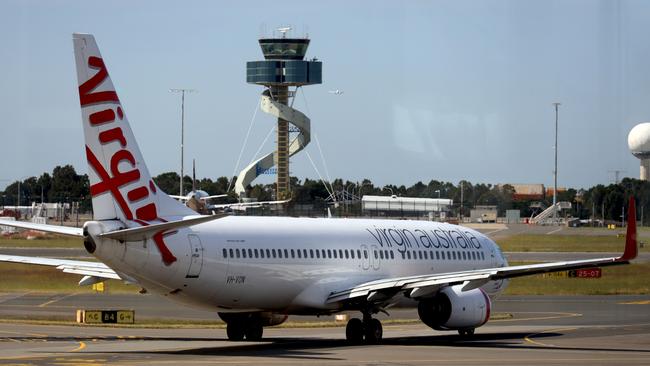The truth behind the high cancellation rates on the Sydney-Melbourne air route
Sydney Airport has accused major airlines of a strategy to keep competitors from accessing Australia’s biggest gateway.

Sydney Airport’s chief executive has blown the whistle on a strategy being used by Qantas and Virgin Australia to keep other airlines from gaining access to Australia’s biggest gateway.
Geoff Culbert said the major domestic carriers were asking for considerably more slots than needed in Sydney and then cancelling dozens of flights.
Slots are an authorisation to take off or land at an airport in a specified time period and are in high demand at Sydney because of the gateway’s importance to air travel.
Mr Culbert said last season, the Qantas Group filed for 106 per cent of its 2019 capacity and Virgin filed for 95 per cent of pre-Covid slots.
“The actual number of flights flown will be significantly lower than that because of the cancellation rates on the Sydney-Melbourne route,” he said.
“They’re running at about 10 per cent (whereas) the national cancellation rate is 3.9 per cent so all the data indicates there is over-filing and that does prevent airlines from getting access to Sydney Airport.”
Bureau of Infrastructure, Transport and Regional Economics data for February showed Jetstar had the highest cancellation rate on Sydney-Melbourne, axing 16.2 per cent of flights while Qantas scrapped 11.3 per cent.
Virgin Australia cancelled 9.4 per cent of flights on Sydney-Melbourne and Rex 3 per cent, for an overall cancellation rate on the route of 10.8 per cent.
New low-cost carrier Bonza is among the airlines that have been unable to secure well-timed slots in Sydney, which is constrained by a nightly curfew.
Mr Culbert hoped a report on Sydney Airport’s demand management scheme, currently awaiting the government’s response, would help resolve the issue.
“It’s something that’s been happening for years and ultimately it reduces the productivity and efficiency of the airport, and it impacts the travelling public who are subject to cancellations and delays,” he said.
Qantas rejected the notion the airline was deliberately “hoarding” slots to shut out competition at Sydney Airport.
A submission to the demand management scheme review said flight cancellations in Sydney were more likely to be due to factors outside of the airline’s control, such as fog, storms and wind.
“Qantas is utilising its slots in accordance with the rule and strongly denies suggestions of impropriety,” said the submission.
Virgin Australia declined to comment.
The other big impediment to airlines seeking to access the airport was the flight cap regulation, which was supposed to allow for 80 services an hour but in practice limited takeoffs and landings to 72 or 73 an hour.
Mr Culbert said that meant they were “leaving six or seven flights on the table every hour”, which made it difficult for Bonza or other new airlines to gain access.
“We feel like the rules are outdated. They’re 20 years old and no longer fit for purpose,” he said. “We’re regulated to do 80 flights an hour and the rules should operate in such a way that we’re able to do 80 flights an hour.
“If we’re able to do that it will promote more choice for passengers, it’ll enable us to recover from delays and ultimately be better for everyone.”
The Easter holiday period loomed as another test for the airport which struggled to cope with last year’s surge in travel when borders reopened.
In the three weeks from April 3 to 23, 2.4 million people were expected to pass through the three terminals – including 1.5 million domestic travellers, and 850,000 international.
The foot traffic promised to be the heaviest since Christmas 2019, and Mr Culbert said this time, they were ready.
“We’re at a point now where 95 per cent of all domestic passengers are getting through security in less than 5-minutes and the remaining 5 per cent are getting through in less than 15-minutes and that’s been very consistent in the last few months,” he said.
“We’ll have extra resourcing in place to manage the influx of passengers over the next few weeks, so it will be busy but we don’t expect it to be chaotic.”







To join the conversation, please log in. Don't have an account? Register
Join the conversation, you are commenting as Logout